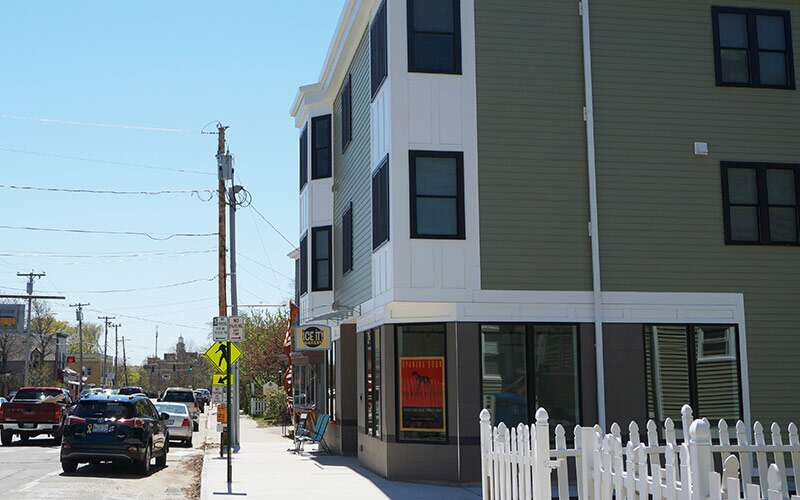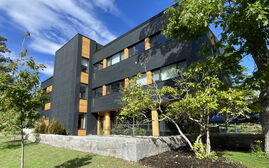
Processing Your Payment
Please do not leave this page until complete. This can take a few moments.
Development catalysts can be big or small, GrowSmart winners prove
 Courtesy / Lachman Architects and Planners
The new building at 502 Stevens Ave. in Portland's Deering Center neighborhood was designed to fit in with the neighborhood, but also to add cohesion. It has been named an Outstanding Project by GrowSmart Maine.
Courtesy / Lachman Architects and Planners
The new building at 502 Stevens Ave. in Portland's Deering Center neighborhood was designed to fit in with the neighborhood, but also to add cohesion. It has been named an Outstanding Project by GrowSmart Maine.
Two building projects — one high-profile and one a small neighborhood project with a big reach — are among six inaugural GrowSmart Award winners.
The awards recognize growth the helps communities while maintaining historic and natural assets, GrowSmart Maine said.
The two Outstanding Project winners, while poles apart in size and function, are both acting as catalysts for their urban community.
502 Deering Center, at 502 Stevens Ave. in Portland, is a three-story 9,643-square-foot mixed-use building in tightly packed historic area of the city.
The Bill and Joan Alfond Main Street Commons at 151 Main St., Waterville, Colby College’s 102,000-square-foot retail and residential building, is part of the college’s $50 million investment in revitalizing downtown.
Nancy Smith, executive director of GrowSmart Maine, said the awards were launched this year to draw attention to smart growth.
“We wanted to show how smart growth is flourishing throughout Maine, as well as illustrate what smart growth looks like,” she said. The six winners — a combination of building projects, policies and downtown plans — emulate smart growth principles, she said..
Those principles include helping communities welcome growth in established areas, while maintaining historic and natural assets, encouraging mixed use, diverse housing and transportation options, and community engagement.
“Smart growth has reached a pivotal moment in Maine,” Smith said. “The combination of an aging population, growth of downtown revitalizations, changing climate, and growing energy awareness has created market forces that make the core values of smart growth attractive to a wider variety of people.”
A Deering Center catalyst

502 Deering Center, designed and owned by architects Denis Lachman and Kiya Smith, of Portland, includes three commercial spaces, six apartments and a pocket park. It was built last year and opened this spring.
It’s at 502 Stevens Ave., in the heart of the city’s active and diverse Deering Center neighborhood, on less than a quarter of an acre. The design made a lot of use of a small lot, while also setting ambitious goals for use and impact on the neighborhood. It was completed in the spring.
“[It] demonstrates that it is possible, on a limited budget, to successfully reintroduce the historic form of a four-story mixed-use building on a compact lot,” GrowSmart said in naming it a winner. “This concept has proven practical, flexible and attractive for more than a century and a half.”
The ground floor storefront retail spaces are occupied by the second location of Yarmouth’s Ice It! Bakery and Darby Jones, a fashion accessories store. The building also includes a ground-floor live/work yoga studio and six apartments on two upper floors.
A public pocket park is also part of the site, a “pause and meet” area with benches, a bike rack, drought-resistant native plants and pervious pavers, which also provides open space between the building and Roy’s Shoe Shop next door. There is also onsite parking in the back.
The building is part of the “tried and true” signature form of downtowns and village centers, Lachman and Smith said in their submission to the contest.
Dense, three- and four-story mixed-use buildings on compact lots “is the fabric we know and love, and others admire — because it has proven practical, flexible and attractive for a century and a half,” they said.
“However, over the past half century, land use zoning, economics, banking and building codes have unintentionally conspired to disincentivize this building type” they said. “We believe that new fabric buildings are a critical piece of our growth solution puzzle.” But the lack of incentives has resulted in a lack of new mixed-use compact-lot infill projects.
The small and restricted lots create “many steep design and financial challenges.”
“Their surrounding neighbors are close, so expectations are high for projects to fit well into their context,” the designers said. “Limited sites under perform for large developers, so it is smaller developers who must overcome their many challenges.”
Small project, big goals

The project was designed to complement the neighborhood and buildings around it and use the small space as efficiently as possible.
“The design wants to be a graceful neighbor now as well as a century from now,” Lachman and Smith said.
But the small project also had some big goals, including to catalyze traditional residential/retail renovation and development that fits with the neighborhood, helps strengthen the community fabric while also providing needed housing.
Some of the specific goals laid out by the designers were to:
- Demonstrate that it’s possible, on a limited budget, to successfully re-introduce Maine’s downtown mixed-use fabric;
- Demonstrate that new downtown fabric can/should be done according to Smart Growth principles;
- Provide a real-life example that this type of project “continues to be as practical, flexible and attractive as ever”;
- Show that new mixed-use infill can gracefully complement existing downtown architecture;
- Demonstrate to neighborhoods “that the process for new development can be respectful and
- result in win-win-win for the neighborhood, developer and municipality”;
- Pave the way for similar mixed-use compact-infill projects as working example for developers, lenders, regulatory agencies and commercial and residential tenants.
502 Deering Center is also in one of the city’s most energetic off-peninsula neighborhoods.
Deering started out as a separate municipality before it joined Portland, and still retains an autonomous vibe. Historically, it’s been a thriving neighborhood, home to Deering High School, the Portland campus of the University of New England (on the former Westbrook College campus), and a variety of small shops and restaurants.
The Baxter Woods park, with walking trails and woods, is at the center of the neighborhood.
Recent additions to the neighborhood include renovation of the former St. Joseph Convent Motherhouse into 88 units of senior housing. The second location of South Portland’s popular Elsmere BBQ & Wood Grill opened at 476 Stevens Ave. over the summer.
“Deering Center already is, and has been for generations, a classic mixed-use and mixed-income neighborhood that brings together housing, businesses, shops, cultural venues, greenspace and pocket parks,” Lachman and Smith wrote. “Creating settings where residents can walk to shop, work, play, rest, engage and visit.”
Carroll Associates, of Portland, was landscape architect and site permitting firm; Pinkham & Greer, of Portland, was the civil engineer; L&L Structural, South Portland, was structural engineer; Bennett Engineering, of Freeport, did the electrical and plumbing engineer; Ducas Construction, Scarborough, was construction manager.
Bernstein Shur, Portland, was legal counsel and financing was by Gorham Savings Bank.
Colby's vision comes to life

Colby College’s $50 million investment into revitalizing downtown Waterville includes the Bill and Joan Alfond Main Street Commons, which is a dormitory, retail and community building that stretches down a block of Main Street.
It opened in late August and houses 200 students and faculty, provides additional education space and a public community civic meeting area, as well as first-floor commercial-retail space, including a Camden National Bank branch.
While it’s at the edge of a large parking lot, students who live in the Commons and have cars, park at Colby College, a mile away, and take the shuttle, or walk or bike back and forth from campus.
“With widened sidewalks, added streetscape amenities and an integrated complete streets design, Colby's plan minimizes new auto traffic and focuses on diversifying transit options,” GrowSmart said.
Brian Clark, vice president of planning for Colby College, said Tuesday the building “helps to realize the vision of a bustling and pedestrian-friendly downtown.”
Colby has also bought six buildings in a four-block area of downtown Waterville, one of which, at 173 Main St., across the street from the Commons, has been renovated and opened as mixed retail and office use.
The Commons, built on a 0.77 acre section of parking lot at the corner of Main and Temple streets that was created out of the city’s 1969 urban renewal project, is the first major new construction on Main Street in more than half a century, Clark said.
“[It replaces] what was once a fallow site,” he said, adding that the impact “has been immediate, with more people on the street and in the businesses, lights in the windows at night.
The Chace Forum, the public meeting room in the building, in a windowed corner at Main and Appleton streets, hosts Waterville’s city meetings, and is also available for other community public meetings.
Camden National Bank, which is moving from its location farther south on Main Street, will open in the building Monday, closing its current location at 33 Main St. Friday.
The bank building is part of the site where Colby plans to build a hotel, and across the street from two buildings that the college bought in 2015 and have marketed for sale.
Landry/ French, of Scarborough, was the construction manager for the Alfond Commons project.
Public policy and planning
Brian Kent, owner of Kent Associates, a planning and urban design consulting company headquartered in Gardiner, was the Lifetime Achievement Award winner for his contributions to land use planning in Maine.
“Brian Kent’s work in Maine over 40 years demonstrates a strong commitment to smart growth,” the organization said. In 1976, he was responsible for the first Comprehensive Plan for the Land Use Regulation commission and authored its Land Use Handbook, GrowSmart said in announcing his award.
Kent also organized the first major downtown conference in Maine, MainStreets Future.
“As a consultant he's produced over 30 downtown plans as well as co-authoring several important publications illustrating GrowSmart principles.”
Other GrowSmart award winners were the Windham Town Council, for its 21st Century Downtown Zoning plan, recognized for Outstanding Public Policy; the Portland Housing Authority recognized for Outstanding Public Policy for its Strategic Vision plan and Portland’s Planning and Public Works Department for Outstanding Smart Growth Plan for its Franklin Street redesign.














Comments